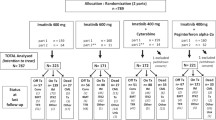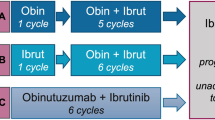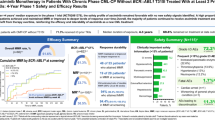Abstract
Inhibition of farnesyltransferase (FT) activity has been associated with in vitro and in vivo anti-leukemia activity. We report the results of a phase 1 dose-escalation study of tipifarnib, an oral FT inhibitor, in patients with relapsed, refractory or newly diagnosed (if over age 70) acute myelogenous leukemia (AML), on a week-on, week-off schedule. Forty-four patients were enrolled, two patients were newly diagnosed, and the rest were relapsed or refractory to previous treatment, with a median age of 61 (range 33–79). The maximum tolerated dose was determined to be 1200 mg given orally twice daily (b.i.d.) on this schedule. Cycle 1 dose-limiting toxicities were hepatic and renal. There were three complete remissions seen, two at the 1200 mg b.i.d. dose and one at the 1000 mg b.i.d. dose, with minor responses seen at the 1400 mg b.i.d. dose level. Pharmacokinetic studies performed at doses of 1400 mg b.i.d. showed linear behavior with minimal accumulation between days 1–5. Tipifarnib administered on a week-on, week-off schedule shows activity at higher doses, and represents an option for future clinical trials in AML.
This is a preview of subscription content, access via your institution
Access options
Subscribe to this journal
Receive 12 print issues and online access
$259.00 per year
only $21.58 per issue
Buy this article
- Purchase on Springer Link
- Instant access to full article PDF
Prices may be subject to local taxes which are calculated during checkout
Similar content being viewed by others
References
Rowinsky EK, Windle JJ, Von Hoff DD . Ras protein farnesyltransferase: a strategic target for anticancer therapeutic development. J Clin Oncol 1999; 17: 3631–3652.
Karp JE, Lancet JE, Kaufmann SH, End DW, Wright JJ, Bol K et al. Clinical and biologic activity of the farnesyltransferase inhibitor R115777 in adults with refractory and relapsed acute leukemias: a phase 1 clinical-laboratory correlative trial. Blood 2001; 97: 3361–3369.
Cox AD, Der CJ . Farnesyltransferase inhibitors and cancer treatment: targeting simply Ras? Biochim Biophys Acta 1997; 1333: F51–F71.
Zujewski J, Horak ID, Bol CJ, Woestenborghs R, Bowden C, End DW et al. Phase I and pharmacokinetic study of farnesyl protein transferase inhibitor R115777 in advanced cancer. J Clin Oncol 2000; 18: 927–941.
Lancet JE, Gojo I, Gotlib J, Feldman EJ, Greer J, Liesveld JL et al. A phase 2 study of the farnesyltransferase inhibitor tipifarnib in poor-risk and elderly patients with previously untreated acute myelogenous leukemia. Blood 2007; 109: 1387–1394.
Kurzrock R, Cortes J, Kantarjian H . Clinical development of farnesyltransferase inhibitors in leukemias and myelodysplastic syndrome. Semin Hematol 2002; 39 (Suppl 3): 20–24.
Lara P, Frankel P, Gumerlock PH, Mack PC, Law LY, Lenz HJ et al. Intermittent dosing of the farnesyl transferase inhibitor R115777 in advanced malignant solid tumors: A Phase I California Cancer Consortium Trial. Anticancer Drugs 2005; 16: 317–321.
Kelland LR . Farnesyl transferase inhibitors in the treatment of breast cancer. Expert Opin Investig Drugs 2003; 12: 413–421.
Cheson BD, Bennett JM, Kopecky KJ, Buchner T, Willman CL, Estey EH et al. Revised recommendations of the International Working Group for Diagnosis. Standardization of response criteria, treatment outcomes, and reporting standards for therapeutic trials in acute myeloid leukemia. J Clin Oncol 2003; 21: 4642–4649.
Zhang S, Zannikos P, Awada A, Piccart-Gebhart M, Dirix LY, Fumoleau P et al. Pharmacokinetics of tipifarnib after oral and intravenous administration in subjects with advanced cancer. J Clin Pharmacol 2006; 46: 1116–1127.
Siegel-Lakhai WS, Crul M, De Porre P, Zhang S, Chang I, Boot H et al. Clinical and pharmacologic study of the farnesyltransferase inhibitor tipifarnib in cancer patients with normal or mildly or moderately impaired hepatic function. J Clin Oncol 2006; 24: 4558–4564.
Zimmerman TM, Harlin H, Odenike OM, Berk S, Sprague E, Karrison T et al. Dose-ranging pharmacodynamic study of tipifarnib (R115777) in patients with relapsed and refractory hematologic malignancies. J Clin Oncol 2004; 22: 4816–4822.
Crul M, de Klerk GJ, Swart M, van’t Veer LJ, de Jong D, Boerrigter L et al. Phase I clinical and pharmacologic study of chronic oral administration of the farnesyl protein transferase inhibitor R115777 in advanced cancer. J Clin Oncol 2002; 20: 2726–2735.
Qin T, Jelinek J, Si J, Shu J, Issa JP . Mechanisms of resistance to 5-aza-2′-deoxycytidine in human cancer cell lines. Blood 2009; 113: 659–667.
Raponi M, Lancet JE, Fan H, Dossey L, Lee G, Gojo I et al. A 2-gene classifier for predicting response to the farnesyltransferase inhibitor tipifarnib in acute myeloid leukemia. Blood 2008; 111: 2589–2596.
Acknowledgements
We thank the City of Hope medical, nursing and administrative staff for their dedication and support for this study. We also thank Sandra Thomas for assistance with editing and review of the manuscript. This work was supported by grant nos. U01-CA-62505 and N01-CM-62209 (NCI Cancer Therapy Evaluation Program) and P30-CA-033572 (City of Hope).
Author information
Authors and Affiliations
Corresponding author
Ethics declarations
Competing interests
The authors declare no conflict of interest.
Rights and permissions
About this article
Cite this article
Kirschbaum, M., Synold, T., Stein, A. et al. A phase 1 trial dose-escalation study of tipifarnib on a week-on, week-off schedule in relapsed, refractory or high-risk myeloid leukemia. Leukemia 25, 1543–1547 (2011). https://doi.org/10.1038/leu.2011.124
Received:
Revised:
Accepted:
Published:
Issue Date:
DOI: https://doi.org/10.1038/leu.2011.124
Keywords
This article is cited by
-
Phase I study of sorafenib and tipifarnib for recurrent glioblastoma: NABTC 05-02
Journal of Neuro-Oncology (2018)
-
Treatment of NRAS-Mutant Melanoma
Current Treatment Options in Oncology (2015)
-
Pediatric Relapsed or Refractory Leukemia: New Pharmacotherapeutic Developments and Future Directions
Drugs (2013)
-
Treatment of human pre-B acute lymphoblastic leukemia with the Aurora kinase inhibitor PHA-739358 (Danusertib)
Molecular Cancer (2012)



